|
|
|
Sort Order |
|
|
|
Items / Page
|
|
|
|
|
|
|
| Srl | Item |
| 1 |
ID:
156719
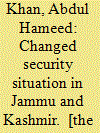

|
|
|
|
|
| Publication |
New Delhi, IDSA, 2017.
|
| Description |
80p.pbk
|
| Series |
IDSA Monograph Series no. 61
|
| Standard Number |
9789382169758
|
|
|
|
|
|
|
|
|
|
|
|
Copies: C:2/I:0,R:0,Q:0
Circulation
| Accession# | Call# | Current Location | Status | Policy | Location |
| 059234 | 320.9546/KHA 059234 | Main | On Shelf | General | |
| 059235 | 320.9546/KHA 059235 | Main | On Shelf | General | |
|
|
|
|
| 2 |
ID:
185763
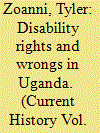

|
|
|
|
|
| Summary/Abstract |
Uganda’s disability story is justly celebrated. The country has ratified some of the most progressive disability laws and policies in the world, and it is home to a robust disability activist movement. Disability is also highly visible in mass media and public life. At the same time, however, these laws, activism, and publicity have not significantly changed the lives of most disabled Ugandans. Uganda’s story is important in its own right, but it also illustrates some of the possibilities and limitations of the rights-based paradigm that now dominates disability activism and politics around the world.
|
|
|
|
|
|
|
|
|
|
|
|
|
|
|
|
| 3 |
ID:
171188


|
|
|
|
|
| Summary/Abstract |
This article examines the Kenya Colony administration’s use of communal labor as a punitive, coercive labor practice during the Mau Mau rebellion of the 1950s. Faced with the Mau Mau rebellion, the administration transformed the preexisting communal labor system and began to use it on an unprecedented scale as a form of collective punishment against the mainly Kikuyu African civilian populations thought to be in collusion with the Mau Mau guerrillas. Communal labor, which was previously justified as a building block of development and used widely throughout the colony as cooperative village labor, now became an aspect of the punitive “rehabilitation” of the Kikuyu populace in Central Province. Although colonial officials directed Emergency communal labor against all of the African civilians living in the rural areas of Central Province thought to be in tacit support of Mau Mau, women were the corps of most of the communal labor work parties. As a result, this article examines the role of gender in the British administration’s wielding of communal labor as a punitive measure in Central Province during this time period. This window into the machinations of communal forced labor also sheds more light on the wider issue of gender and forced labor during the colonial period in Africa.
|
|
|
|
|
|
|
|
|
|
|
|
|
|
|
|
| 4 |
ID:
152011
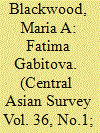

|
|
|
|
|
| Summary/Abstract |
This article examines the personal papers of Fatima Gabitova, a writer and pedagogue who fell victim to Stalinist repression as a ‘wife of an enemy of the people’ in the Kazakh SSR. Gabitova’s life was in many ways extraordinary, and many of her experiences were hardly typical. Nevertheless, her exposure to Kazakhstan’s cultural and political elites and the rich textual archive she left behind provide a highly nuanced window into the lived experience of Stalinism in Kazakhstan. Her writings, which include journals, poetry, letters and memoiristic essays, reveal a highly articulated sense of self that was informed and influenced by the realities of life under Stalinism, but was not ultimately determined by the parameters of the Soviet system. Throughout her personal writings, Gabitova exhibits a complicated ambivalence towards the reality of Soviet rule that demonstrates the broader contradictions of Stalinism as a system that was at once repressive and participatory.
|
|
|
|
|
|
|
|
|
|
|
|
|
|
|
|
| 5 |
ID:
146786
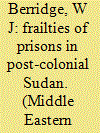

|
|
|
|
|
| Summary/Abstract |
This article examines the slow eclipse of the rehabilitative ideal within the Sudanese prison system in the period from independence in 1956 till the removal of the third parliamentary regime in 1989. It contends that Jacfar Numayri's ‘Islamization’ of the criminal and penal system in 1983, which has been interpreted by some as an act of religious revival aiming to replace a series of externally imposed and European laws, cannot be understood purely in cultural terms. It will demonstrate that the Sudanese prison professionals of the post-colonial era pursued rehabilitative ideals with greater enthusiasm than their colonial predecessors. However, they were hampered by the limited resources offered to them by a government that became increasingly less interested in infrastructural social control and more concerned with exercising direct physical violence against both political and non-political transgessors of the state's law.
|
|
|
|
|
|
|
|
|
|
|
|
|
|
|
|
| 6 |
ID:
137515


|
|
|
|
|
| Summary/Abstract |
Scholarship on humanities in Southeast Asia done by Chinese descendants is significantly different from the work of diasporic Chinese scholars in North America. The latter is divided by strategic choices of scholars as to how to represent Asian and Chinese Americans, who presumably struggle for recognition and equality in the Anglo-Saxon mainstream. Several nstances have shown an unwanted sense of inferiority. Scholarship of one choice may inadvertently expose, arouse, or reproduce this sense of inferiority among those scholars making a different choice.
|
|
|
|
|
|
|
|
|
|
|
|
|
|
|
|
| 7 |
ID:
128535
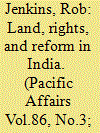

|
|
|
|
|
| Publication |
2013.
|
| Summary/Abstract |
India's legal regime governing the compulsory acquisition of private land by the state for "public purposes" - centered on the Land Acquisition Act 1894 (LAA) - has long been criticized for breeding corruption and insufficiently protecting landowners and local communities. Attempts to overhaul the LAA have faced stiff resistance from powerful interests within and outside the state. When the United Progressive Alliance government took power in 2004, few would have guessed that it would seek to replace the LAA with legislation that imposes more rigorous standards for the compulsory acquisition of land and detailed rules for rehabilitating displaced people. Yet, in 2011 the government introduced the Land Acquisition, Rehabilitation and Resettlement Bill (LARRB). This article argues (1) that the LARRB displays certain distinctive characteristics shared by other rights-related statutes enacted under the UPA government; (2) that the emergence of this distinctive - and unforeseen - piece of legislation was driven largely by India's approach to creating Special Economic Zones; and (3) that both the LARRB's content and the process by which it was introduced have implications for debates of wider theoretical significance, including the increasingly hybrid nature of rights, and the desirability of combining insights from the literatures on "policy feedback" and "policy entrepreneurs."
|
|
|
|
|
|
|
|
|
|
|
|
|
|
|
|
| 8 |
ID:
179299
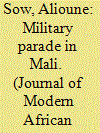

|
|
|
|
|
| Summary/Abstract |
This essay argues that the Independence Day's military parade in Mali has become a strategic site to negotiate fragile military and civil relations, and a repository to promote social change through the military experience. Drawing on field observations of the parade of the 50th anniversary of Independence in Bamako and the literature on political transitions, this essay demonstrates that military parades constitute meaningful sites for alternative engagements with democratic transitions. It examines the tactics and mechanisms deployed by the Malian national army to negotiate past human rights violations and authoritarian practices, as well as to seek the army's rehabilitation following the collapse of the military regime. By analysing military parades as a form and practice consolidating the ‘social contract’ between the army and the public after the political transition, this article contributes to the scholarship on transition and the study of military parades within the African continent.
|
|
|
|
|
|
|
|
|
|
|
|
|
|
|
|
| 9 |
ID:
155528
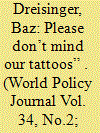

|
|
|
|
|
| Summary/Abstract |
Singapore has transformed its prison system over the last 20 years to focus on rehabilitation, and recidivism rates have fallen by nearly 50 percent. But Baz Dreisinger finds that the government’s push to employ former prisoners is driven more by an abundance of low-level jobs than any moral calculus.
|
|
|
|
|
|
|
|
|
|
|
|
|
|
|
|
| 10 |
ID:
102046
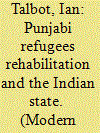

|
|
|
|
|
| Publication |
2011.
|
| Summary/Abstract |
Studies of Punjabi partition-related refugee resettlement have revealed a gap between official accounts and those provided by migrants. The former seek to legitimize the state by narrating its role in the transformation of helpless refugees into productive citizens. First hand accounts on the other hand frequently write the state out of the rehabilitation process. This paper seeks firstly to illustrate these processes at work by contrasting the narrative account contained in the Government of India publication, The Story of Rehabilitation, with interview material collected amongst former refugees. It then goes on to reveal the presence of state agency in cases of rehabilitation, despite refugee denial. Finally, it explores the refugee-state tensions arising from migrants' experience of local level bureaucratic and police services' corruption, which goes some way towards explaining the narrative dissonances.
|
|
|
|
|
|
|
|
|
|
|
|
|
|
|
|
| 11 |
ID:
095296
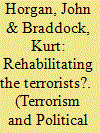

|
|
|
|
|
| Publication |
2010.
|
| Summary/Abstract |
Renewed interest on how and why terrorism ends has emerged in parallel with increased visibility of some new and innovative approaches to counterterrorism. These are collectively known, whether for good or bad, as "de-radicalization programs." However, and despite their popularity, data surrounding even the most basic of facts about these programs remains limited. This article presents an overview of the results of a one-year pilot study of select de-radicalization programs and investigates critical issues surrounding assessment of their effectiveness and outcomes. We argue that Multi Attribute Utility Technology (MAUT) may offer promise for future empirical assessment of what we prefer to designate "terrorism risk reduction initiatives." Perhaps less obviously, and until more data surrounding the efficacy of such initiatives becomes available, MAUT may also provide a conceptual basis for planning, evaluating, and guiding the development of future such initiatives and may have the unanticipated consequence of facilitating progress by encouraging greater exploration of efforts to change behavior from other contexts.
|
|
|
|
|
|
|
|
|
|
|
|
|
|
|
|
| 12 |
ID:
116663
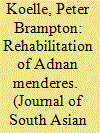

|
|
|
| 13 |
ID:
140289


|
|
|
|
|
| Summary/Abstract |
On 15 August 1950, just as India was celebrating its third independence anniversary, an earthquake of 8.6 magnitude struck the remote northeastern state of Assam and its surrounding borderlands. Rivers burst their banks and landslides blocked Himalayan valleys, destroying towns, villages, roads, fields, and tea gardens in their wake. Beyond the disaster's shattering impact on the physical geography of the region, this article explores how it participated in another reconfiguration—that of Assam's place within India's political geography and national imaginary. The Indian public had hitherto known very little about India's remote ‘northeast frontier’; the cataclysm and subsequent relief measures served to carve out a space for it on Indian mental maps. Simultaneously, by forcing a large-scale encounter between Indian authorities and the people of the scarcely controlled eastern Himalayas, post-earthquake relief and rehabilitation led to unprecedented state expansion in this newly strategic borderland. Yet in the same breath, the aftermath of the disaster fuelled stereotypes about Assam and its hinterland that would eventually further their marginality within India and undermine their continued unity. The crystallization of Assam's image as a place irreducibly subject to the whims of nature and, more importantly, incapable of taking care of itself (and hence, of its highland dependencies), would poison centre–state relations for decades to come. Imperfect and contradictory, the reordering of this border space from a colonial frontier to a component of independent India's national space did not end marginality, but instead reinforced it.
|
|
|
|
|
|
|
|
|
|
|
|
|
|
|
|
| 14 |
ID:
086748
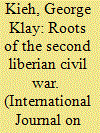

|
|
|
|
|
| Publication |
2009.
|
| Summary/Abstract |
This article examines the roots of civil war in Liberia. He notes that the peace imposed after the first civil war laid the seeds of a second civil war. Too often peace settlements aimed at ending fighting do not contain a process for the resolution of underlying social problems. Thus, they become a temporary cessation of violence rather than a real peace. In Liberia there was scarcely two years between the end of the first civil war and the onset of a second. The lack of an adequate national security regime led to the competition for state power among warlords.
|
|
|
|
|
|
|
|
|
|
|
|
|
|
|
|
| 15 |
ID:
178869


|
|
|
|
|
| Summary/Abstract |
In the aftermath of Partition, the Government of India suddenly found itself to be responsible for a large number of refugee women who were not ‘attached’ to male guardians. The national government readily acknowledged the fate of these widowed, abandoned or abducted women as a sphere of feminine expertise and sought the active participation of prominent social workers such as Rameshwari Nehru, Mridula Sarabhai, Ashoka Gupta and Romola Sinha. Referred to as ‘lady social workers’, these women worked as volunteers and advisors to rehabilitate unattached women. Focusing on the voluntary service of social workers in West Bengal, and drawing upon the memoirs and personal papers of Ashoka Gupta, this article seeks to understand the limits and possibilities of this role. Was their role entirely circumscribed by the larger patriarchal vision of rehabilitation that treated ‘unattached’ refugee women as permanent liabilities of the state, or could they author policy that benefitted refugee women? Through a close reading of the solutions, schemes and reforms proposed by lady social workers, this paper suggests a complex relationship that resists such binaries.
|
|
|
|
|
|
|
|
|
|
|
|
|
|
|
|
| 16 |
ID:
067008


|
|
|
| 17 |
ID:
126115
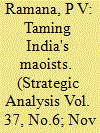

|
|
|
|
|
| Publication |
2013.
|
| Summary/Abstract |
This article seeks to make a preliminary assessment of the surrender and rehabilitation policy being adopted towards Naxalites. The examples/experiences cited in this paper refer largely to cadres and leaders of Communist Party of India (Maoist), or CPI (Maoist). It is part of a multi-pronged conflict management and resolution strategy and is required to be implemented along with firm action by police against those who follow the path of violence. This article argues that (a) the various affected states should evince interest to obtain surrenders; (b) put in place a robust surrender and rehabilitation policy, preferably at the national level; (c) secure surrenders on a case-by-case basis; (d) intensify security operations; and (e) policy implementation should be effective and closely monitored.
|
|
|
|
|
|
|
|
|
|
|
|
|
|
|
|
| 18 |
ID:
106586


|
|
|
|
|
| Publication |
2011.
|
| Summary/Abstract |
While a consensus has emerged concerning the role radicalization plays in persuading Westerners to participate in terrorism, little research investigates the cognitive processes inherent to radicalization processes. Transformative learning theory, developed from the sciences in education and rehabilitation, offers an interdisciplinary lens with which to study the processes of personal change associated with radicalization. Transformative radicalization explains how triggering factors lead to critical reflection of meaning perspectives and personal belief systems that guide and alter behavior. Using an autobiographical account of the radicalization process, this study offers a plausibility probe of an inherently interdisciplinary and novel theoretical framework.
|
|
|
|
|
|
|
|
|
|
|
|
|
|
|
|
| 19 |
ID:
095778
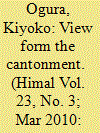

|
|
|
| 20 |
ID:
161391


|
|
|
|
|
| Summary/Abstract |
The history of the Yarkon River in the twentieth century reveals the ecological problem of the principal perennial stream flowing almost entirely within the country. Until the 1950s, the Yarkon was a pleasant stream, but the water was insanitary for drinking or swimming. Since the construction and expansion of the Yarkon‒Negev pipeline Project, part of the National Water Plan (since 1955), the water level has gone down and pollution has increased. This article deals with the story of the contamination of the Yarkon, the reflection of this situation in the press, and the failed attempts to purify the river in the decades after the establishment of the State of Israel.
|
|
|
|
|
|
|
|
|
|
|
|
|
|
|
|
|
|
|
|
|